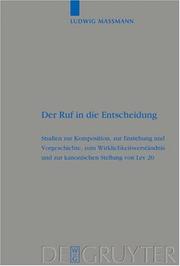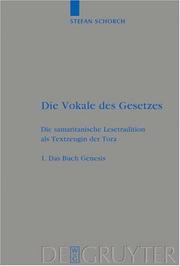| Listing 1 - 5 of 5 |
Sort by
|
Book
ISBN: 9783631665589 363166558X 9783653059083 Year: 2015 Volume: 59 Publisher: Frankfurt am Main Peter Lang Edition
Abstract | Keywords | Export | Availability | Bookmark
 Loading...
Loading...Choose an application
- Reference Manager
- EndNote
- RefWorks (Direct export to RefWorks)
222.1 --- Octateuch. Heptateuch. Hexateuch. Pentateuch. Boeken van Mozes --- Bible. --- Chumash --- Five Books of Moses --- Ḥamishah ḥumshe Torah --- Ḥumash --- Kitāb-i Muqqadas --- Mose Ogyŏng (Book of the Old Testament) --- Pentateuch --- Pi︠a︡toknizhīe Moiseevo --- Sefer Ḥamishah ḥumshe Torah --- Tawrāh --- Torà (Pentateuch) --- Torah (Pentateuch) --- Tʻoris xutʻcigneuli --- Ureta --- תורה --- Haftarot --- Criticism, Redaction. --- Criticism, interpretation, etc.
Multi
ISSN: 22136401 ISBN: 9789004289918 9004289917 9789004289932 9004289933 Year: 2015 Volume: 2 Publisher: Boston
Abstract | Keywords | Export | Availability | Bookmark
 Loading...
Loading...Choose an application
- Reference Manager
- EndNote
- RefWorks (Direct export to RefWorks)
This work offers a seminal research into Arabic translations of the Pentateuch. It is no exaggeration to speak of this field as a terra incognita. Biblical versions in Arabic were produced over many centuries, on the basis of a wide range of source languages (Hebrew, Syriac, Greek, or Coptic), and in varying contexts. The textual evidence for this study is exclusively based on a corpus of about 150 manuscripts, containing the Pentateuch in Arabic or parts thereof.
Bible. --- Bible --- Manuscripts, Arabic --- Versions --- Criticism, interpretation, etc --- Translating --- Manuscripts, Arabic. --- 221.02 --- 222.1 --- Arabic manuscripts --- Oud Testament: bijbelse filologie --- Octateuch. Heptateuch. Hexateuch. Pentateuch. Boeken van Mozes --- Chumash --- Five Books of Moses --- Ḥamishah ḥumshe Torah --- Ḥumash --- Kitāb-i Muqqadas --- Mose Ogyŏng (Book of the Old Testament) --- Pentateuch --- Pi︠a︡toknizhīe Moiseevo --- Sefer Ḥamishah ḥumshe Torah --- Tawrāh --- Torà (Pentateuch) --- Torah (Pentateuch) --- Tʻoris xutʻcigneuli --- Ureta --- תורה --- Haftarot --- Versions. --- Criticism, interpretation, etc. --- Translating.
Book
ISBN: 9789004296763 900429676X 9789004307049 9004307044 Year: 2015 Volume: 67 Publisher: Leiden Koninklijke Brill NV
Abstract | Keywords | Export | Availability | Bookmark
 Loading...
Loading...Choose an application
- Reference Manager
- EndNote
- RefWorks (Direct export to RefWorks)
In The Deuteronomist’s History , Hans Ausloos provides for the first time a detailed status quaestionis concerning the relationship between the books Genesis–Numbers and the so-called Deuteronom(ist)ic literature. After a presentation of the origins of the 18th and 19th century hypothesis of a Deuteronom(ist)ic redaction, specific attention is paid to the argumentation used during the last century. Particular interest also is paid to the concept of the proto-Deuteronomist and the mostly tentative approaches of the Deuteronom(ist)ic ‘redaction’ of the Pentateuch during the last decades. The book concludes with a critical review and preview of the Deuteronom(ist)ic problem. Each phase in the Deuteronomist’s history is illustrated on the basis of the epilogue of the Book of the Covenant (Exod. 23:20-33).
Deuteronomistic history (Biblical criticism) --- Bible. --- Criticism, interpretation, etc. --- 222.2 --- 222.3 --- 222.4 --- Deuteronomic history (Biblical criticism) --- Deuteronomists (Biblical criticism) --- DH (Biblical criticism) --- D document (Biblical criticism) --- Genesis --- Exodus. Leviticus. Numeri --- Deuteronomium --- Chumash --- Five Books of Moses --- Ḥamishah ḥumshe Torah --- Ḥumash --- Kitāb-i Muqqadas --- Mose Ogyŏng (Book of the Old Testament) --- Pentateuch --- Pi︠a︡toknizhīe Moiseevo --- Sefer Ḥamishah ḥumshe Torah --- Tawrāh --- Torà (Pentateuch) --- Torah (Pentateuch) --- Tʻoris xutʻcigneuli --- Ureta --- תורה --- Haftarot --- Bible --- Criticism, interpretation, etc

ISBN: 3110176440 3110902192 9783110176445 Year: 2015 Volume: 324 Publisher: Berlin ; Boston : De Gruyter,
Abstract | Keywords | Export | Availability | Bookmark
 Loading...
Loading...Choose an application
- Reference Manager
- EndNote
- RefWorks (Direct export to RefWorks)
An interpretation of Lev 20, updated for publication. In addition to classical methods of exegesis, it also uses other approaches, particularly those from cultural anthropology. The study first clarifies the scholarly prerequisites, working on the assumption that Lev 17-26 is an integral part of the Priestly Source ("P" text). The text itself is examined in both its synchronic and diachronic aspects and identified as a reader and sermon which reflects internal Jewish conflicts in the post-exile community. The whole of the formulaic content of the death sentences in Lev 20 is analysed thoroughly and discussed against the background of the thesis of "social death" (H.-P. Hasenfratz). Within the text complex of Lev 11-22, Lev 20 is concerned with irreversible impurity, which leads to exclusion from Israel, and the concluding interpretation of Israel as a people sacred to YHWH. The study closes with a theology of Lev 20 and a preview of the history of capital punishment in later Judaism. Diese für die Drucklegung aktualisierte Auslegung von Lev 20 wendet neben klassischen exegetischen Methoden auch andere, vor allem kulturanthropologische Ansätze an. Die Studie klärt zunächst die einleitungswissenschaftlichen Voraussetzungen und geht davon aus, daß Lev 17-26 integraler Bestandteil der Priesterschrift ist. Der Text selbst wird auf synchroner und diachroner Ebene untersucht und als Lese- und Predigtstück bestimmt, das innerjüdische Konflikte der nachexilischen Gemeinde abbildet. Das gesamte formelhafte Gut der in Lev 20 enthaltenen Todessätze wird gründlich analysiert und dann vor dem Hintergrund der These über den "sozialen Tod" (H.-P. Hasenfratz) diskutiert. Innerhalb des Textkomplexes Lev 11-22 geht es in Lev 20 um irreversible Unreinheit, die aus Israel ausschließt, und um die abschließende Deutung Israels als für JHWH geheiligtes Volk. Eine Theologie von Lev 20 und ein Ausblick auf die Geschichte des Todesrechts im späteren Judentum runden die Arbeit ab.
222.3 --- Exodus. Leviticus. Numeri --- Bible. --- Criticism, interpretation, etc. --- Kanon. --- Levitikus. --- Pentateuch. --- Redaktionsgeschichte. --- Todesstrafe. --- Exegese --- RELIGION / Biblical Criticism & Interpretation / Old Testament. --- Bibelauslegung --- Bibelexegese --- Biblische Auslegung --- Bibelinterpretation --- Biblische Exegese --- Schriftauslegung --- Bibelwissenschaft --- Exeget --- Bibel --- Chumash --- Five Books of Moses --- Ḥamishah ḥumshe Torah --- Ḥumash --- Kitāb-i Muqqadas --- Mose Ogyŏng (Book of the Old Testament) --- Pentateuch --- Pi︠a︡toknizhīe Moiseevo --- Sefer Ḥamishah ḥumshe Torah --- Tawrāh --- Torà (Pentateuch) --- Torah (Pentateuch) --- Tʻoris xutʻcigneuli --- Ureta --- תורה --- Haftarot --- Kitāb-i Va-yīgrā (Book of the Old Testament) --- Lāviyān (Book of the Old Testament) --- Leviticus (Book of the Old Testament) --- Lewigi (Book of the Old Testament) --- Newigi (Book of the Old Testament) --- Ṿa-yiḳra --- Ṿayiḳra (Book of the Old Testament) --- Vayikro

ISBN: 3110181010 311092403X 9783110181012 Year: 2015 Volume: 339 Publisher: Berlin ; Boston : De Gruyter,
Abstract | Keywords | Export | Availability | Bookmark
 Loading...
Loading...Choose an application
- Reference Manager
- EndNote
- RefWorks (Direct export to RefWorks)
Untersuchung zu Ursprung und textkritischer Bedeutung der samaritanischen Toralesung als dem wichtigsten außermasoretischen Zeugnis für die Vokalisierung der Tora.
221.02*1 --- Oud Testament: bijbelse filologie: hebreeuws --- 221.02*1 Oud Testament: bijbelse filologie: hebreeuws --- Samaritans. --- Bible. --- Criticism, Textual. --- Samaritan religion --- Samaritanism --- Samaritans --- Jews --- Religion --- Be-reshit (Book of the Old Testament) --- Bereshit (Book of the Old Testament) --- Bytie (Book of the Old Testament) --- Chʻangsegi (Book of the Old Testament) --- Genesis (Book of the Old Testament) --- Sifr al-Takwīn --- Takwīn (Book of the Old Testament) --- Chumash --- Five Books of Moses --- Ḥamishah ḥumshe Torah --- Ḥumash --- Kitāb-i Muqqadas --- Mose Ogyŏng (Book of the Old Testament) --- Pentateuch --- Pi︠a︡toknizhīe Moiseevo --- Sefer Ḥamishah ḥumshe Torah --- Tawrāh --- Torà (Pentateuch) --- Torah (Pentateuch) --- Tʻoris xutʻcigneuli --- Ureta --- תורה --- Haftarot
| Listing 1 - 5 of 5 |
Sort by
|

 Search
Search Feedback
Feedback About UniCat
About UniCat  Help
Help News
News